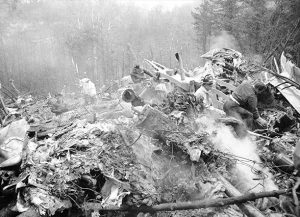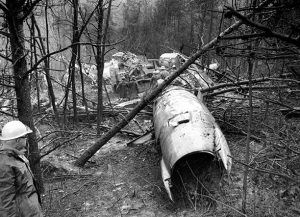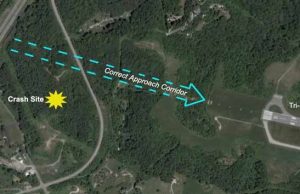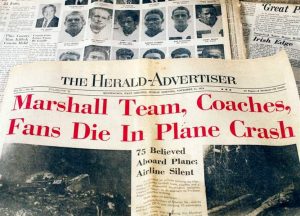
 When a disaster strikes, we often see whole cities affected by the event. Rebuilding takes years, and the emotional scars might never heal. Plane crashes, while a disastrous event, seldom affect an entire town, not even if the plane crashed in the town. Those affect the people who saw the crash, rushed in to help the survivors, and cleaned up the aftermath…usually. That was not the case on November 14, 1970, when a charter plane carrying most of the Marshall University football team clipped a stand of trees and crashed into a hillside just two miles from the Tri-State Airport in Kenova, West Virginia. The team was returning from that day’s game, a 17-14 loss to East Carolina University. The investigators found that the plane was to the right of the correct approach corridor, and that is why they clipped the trees. Nevertheless, the plane crashed killing thirty seven Marshall football players, the team’s coach, its doctors, the university athletic director and 25 team boosters members, who were some of Huntington, West Virginia’s most prominent citizens, and had traveled to North Carolina to cheer on the Thundering Herd. One of the citizens of the town of Huntington later wrote that “the whole fabric, the whole heart of the town was aboard.”
When a disaster strikes, we often see whole cities affected by the event. Rebuilding takes years, and the emotional scars might never heal. Plane crashes, while a disastrous event, seldom affect an entire town, not even if the plane crashed in the town. Those affect the people who saw the crash, rushed in to help the survivors, and cleaned up the aftermath…usually. That was not the case on November 14, 1970, when a charter plane carrying most of the Marshall University football team clipped a stand of trees and crashed into a hillside just two miles from the Tri-State Airport in Kenova, West Virginia. The team was returning from that day’s game, a 17-14 loss to East Carolina University. The investigators found that the plane was to the right of the correct approach corridor, and that is why they clipped the trees. Nevertheless, the plane crashed killing thirty seven Marshall football players, the team’s coach, its doctors, the university athletic director and 25 team boosters members, who were some of Huntington, West Virginia’s most prominent citizens, and had traveled to North Carolina to cheer on the Thundering Herd. One of the citizens of the town of Huntington later wrote that “the whole fabric, the whole heart of the town was aboard.”
It had been a rough decade for the Thundering Herd. Their stadium had been condemned in 1962. It hadn’t been renovated since World War II. From the last game of the 1966 season, the team had not won a game. There had been some issues concerning recruiting violations as well, but the team seemed to be getting back on track. Dishonest coaches had been fired, the field had been rebuilt and they started winning games again. The loss to East Carolina was a real squeaker, and the team was looking forward to a better year the next season. Then disaster struck. For Huntington, the plane crash was “like the Kennedy assassination,” one citizen remembers. “Everybody knows where they were and what they were doing when they heard the news.” The town was in mourning. Shops closed, and windows were draped in black. The university held a memorial service and cancelled the Monday classes. The funerals seemed endless, taking place over the next few weeks. Everyone in town knew these people. Perhaps the saddest ceremony, was that of six players whose remains couldn’t be identified. They were buried together in Spring Hill Cemetery, on a hill overlooking their university.
Marshall got a new football coach…Jack Lengyel, from the College of Wooster in Ohio, who set about rebuilding the team. As a rule, Freshmen are not allowed to play on the Varsity squad, but Marshall was given special permission. Lengyel put together a mix of first year walk ons, and nine veteran players who had not been on the plane that night. It was a long road. The team lost the first game of the 1971 season, but in what seemed to be a miracle, they won their first home game against Ohio’s Xavier University 15-13, with a last second touchdown that seemed almost too good to be true. The team only won one other game that first season. During Lengyel’s four year tenure, they won nine other games, but none of those were as emotional as the first one. It was like they were playing for those who were lost, and maybe they were, or maybe it was because 
 they were playing at home. No matter what happened in the remaining years of Lengyel’s tenure, the town would never forget how he brought the sport out of the ashes and brought hope back to the town. It wasn’t that football was all they had, or even that it could remotely compare to the loss the town had experienced, but I think it was more about honoring those lost, by not giving up. Those lost were not quitters, nor were those who remained.
they were playing at home. No matter what happened in the remaining years of Lengyel’s tenure, the town would never forget how he brought the sport out of the ashes and brought hope back to the town. It wasn’t that football was all they had, or even that it could remotely compare to the loss the town had experienced, but I think it was more about honoring those lost, by not giving up. Those lost were not quitters, nor were those who remained.


Leave a Reply